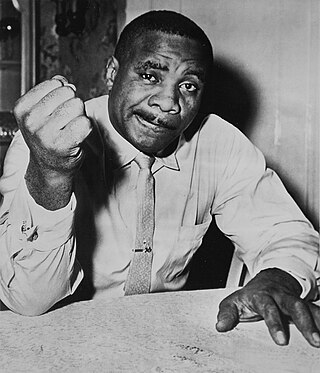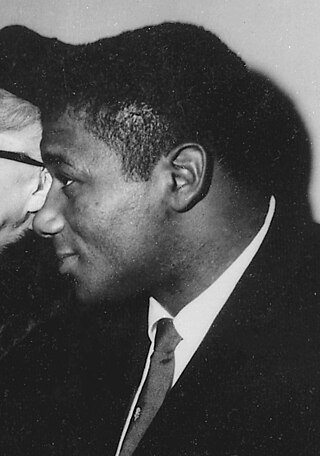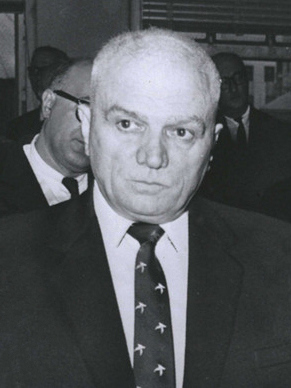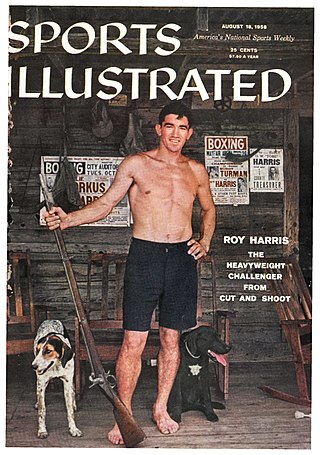
Charles L. "Sonny" Liston, nicknamed "The Big Bear", was an American professional boxer who competed from 1953 to 1970. A dominant contender of his era, he became the undisputed world heavyweight champion in 1962 after knocking out Floyd Patterson in the first round, repeating the knockout the following year in defense of the title; in the latter fight he also became the inaugural WBC heavyweight champion. Often regarded as one of the greatest boxers of all time, Liston was particularly known for his immense strength, formidable jab, long reach, toughness, and is widely regarded as the most intimidating man in the history of the sport.

Floyd Patterson was an American professional boxer who competed from 1952 to 1972, and twice reigned as the world heavyweight champion between 1956 and 1962. At the age of 21, he became the youngest boxer in history to win the title, and was also the first heavyweight to regain the title after losing it. As an amateur, he won a gold medal in the middleweight division at the 1952 Summer Olympics. He is recognised as one of the best heavyweights of all time.
Jerry Quarry, nicknamed "Irish" or "The Bellflower Bomber", was an American professional boxer. During the peak of his career from 1968 to 1971, Quarry was rated by The Ring magazine as the most popular fighter in the sport. His most famous bouts were against Muhammad Ali. He is regarded as being one of the best heavyweight boxers never to win a title. He beat former world heavyweight champion Floyd Patterson and top contenders Ron Lyle, Earnie Shavers, Brian London, Thad Spencer, Buster Mathis, Randy Neumann, Jack Bodell, Mac Foster and Eduardo Corletti. He accumulated damage from lack of attention to defense against larger men at the top level, no head guard sparring, and attempted comebacks in 1977, 1983 and 1992 resulted in Quarry developing an unusually severe case of dementia pugilistica.

Arnold Raymond Cream, best known as Jersey Joe Walcott, was an American professional boxer who competed from 1930 to 1953. He held the NYSAC, NBA, and The Ring heavyweight titles from 1951 to 1952, and broke the record for the oldest man to win the title, at the age of 37. That record would eventually be broken in 1994 by 45-year-old George Foreman. Despite holding the world heavyweight title for a relatively short period of time, Walcott was regarded among the best heavyweights in the world during the 1940s and 1950s.
During the 1960s, boxing, like mostly everything else around the world, went through changing times. Notable was the emergence of a young boxer named Cassius Clay, who would, in his own words shock the world, declare himself against war, and change his name to Muhammad Ali.
During the 1950s, a couple of relatively new developments changed the world: World War II had only been over for five years when the 1950s began, and television was beginning to make a major impact internationally. In boxing, changes connected to these developments could be seen too, as boxers who fought at the 1940s conflict returned to their homes and many of them were back in the ring. Television producers were in love with sports, which provided the viewer with an opportunity to observe sporting events live, and boxing was not the exception to the rule; many television networks began to feature fights live during the weekends, and the Gillette Friday Night Fights proved to be one of the most popular boxing television series in American history.

Jens Ingemar "Ingo" Johansson was a Swedish professional boxer who competed from 1952 to 1963. He held the world heavyweight title from 1959 to 1960, and was the fifth heavyweight champion born outside the United States. Johansson won the title by defeating Floyd Patterson via third-round stoppage, after flooring him seven times in that round. For this achievement, Johansson was awarded the Hickok Belt as top professional athlete of the year—the only non-American in its entire 27-year first run—and was named the Associated Press Male Athlete of the Year and Sports Illustrated Sportsman of the Year.

Jack Sharkey was a Lithuanian-American boxer who held the NYSAC, NBA, and The Ring heavyweight titles from 1932 to 1933.

The two fights between Muhammad Ali and Sonny Liston for boxing's World Heavyweight Championship were among the most controversial fights in the sport's history. Sports Illustrated magazine named their first meeting, the Liston–Clay fight, as the fourth greatest sports moment of the twentieth century.

Theodore A. Atlas Jr. is an American boxing trainer and fight commentator.
Leotis Martin was an American boxer, the first ever NABF heavyweight champion. Martin is best known for his victory over former-undisputed heavyweight champion Sonny Liston. A good puncher and fairly skilled heavyweight, he compiled a record of 31 wins and 5 losses from 1962 to 1969. Outside of Liston, he also won against top contenders Alvin Lewis, Karl Mildenberger, Thad Spencer, Sonny Banks, and Roberto Davila, and was listed by The Ring as one of the 100 greatest punchers of all time. His career, however, was marked by inconsistency and bad luck.

Constantine "Cus" D'Amato was an American boxing manager and trainer who handled the careers of Mike Tyson, Floyd Patterson, and José Torres, all of whom went on to be inducted into the International Boxing Hall of Fame. Several successful boxing trainers, including Teddy Atlas and Kevin Rooney, were tutored by D'Amato. He was a proponent of the peek-a-boo style of boxing, in which the fighter holds his gloves close to his cheeks and pulls his arms tight against his torso, which was criticized by some because it was believed that an efficient attack could not be launched from it.

Zora "Bell" Folley was an American heavyweight boxer who was a top 10 contender for eleven years in a row from 1956 to 1966 and a nine-time top 5 contender throughout his career, reaching a peak as number 1 contender in 1959. He beat top contenders such as Eddie Machen, George Chuvalo, Oscar Bonavena, Henry Cooper, Bob Foster, Nino Valdez, Doug Jones, Johnny Summerlin, Bob Cleroux and drew (tied) against Karl Mildenberger.

Edward Mills "Eddie" Machen was an American professional boxer. He was one of 6 children of a rural mail carrier. Machen dropped out of high school and became an amateur boxer. However, after just 3 bouts he was arrested and convicted of armed robbery. After his release, he became a professional boxer, determined never to return to prison again. His 64-bout career began on March 22, 1955, and he went on to win his first 24 bouts. He was highly rated and fought most of the big names of his era and he defeated many of the important names of his period such as Bob Baker, Jerry Quarry, Niño Valdés, Joey Maxim, Willi Besmanoff, Tommy Jackson, Brian London, Howard King and Doug Jones (boxer)

Phantom Punch is a 2008 film directed by Robert Townsend. The film is a biopic of Sonny Liston, with Ving Rhames in the lead role. The film also stars Stacey Dash, Nicholas Turturro, Alan van Sprang, David Proval, and Bridgette Wilson.

Roy Harris was an American lawyer and heavyweight boxer. His nickname derived from his place of birth, Cut and Shoot, Texas. Roy was a co-trainer of title contender Alfonso López III.

A.k.a. Cassius Clay is a 1970 boxing documentary film about the former heavyweight champion Muhammad Ali.
Muhammad Ali vs. Floyd Patterson was a professional boxing match contested on November 22, 1965, for the WBC, NYSAC and The Ring championship.
Muhammad Ali and Cleveland Williams fought each other in a championship boxing match at the Astrodome in Houston, Texas on November 14, 1966. Ali won the bout through a technical knockout in the third round. Many experts and boxers, including Mike Tyson, regard Ali's performance in this fight to be the finest of his boxing career. This was also the fight in which Ali made famous the move he called the "Ali shuffle".

Muhammad Ali was a boxer who mastered the rope-a-dope fighting technique. He is widely regarded by many boxing commentators and historians as the greatest heavyweight boxer of all time. Boxing magazine The Ring named him number one in a 1998 ranking of greatest heavyweights from all eras. In 1999, The Associated Press voted Ali the number one heavyweight of the 20th century.














